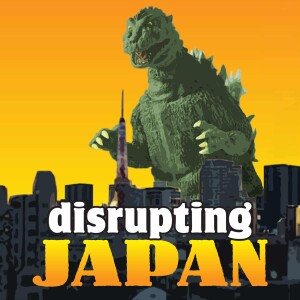
Disrupting Japan: Startups and Venture Capital in Japan
Business:Entrepreneurship

How I Made $8,000 per Month Podcasting, and Why You Probably Don’t Want To
 2019-04-29
2019-04-29
Download
Right click and do "save link as"
This is a rather personal episode. We have no guests this time.
It’s just you and me.
New listeners might not know that for about one year, Disrupting Japan was sponsored and was my primary source of income.
So today, rather than diving deep into a specific aspect of startups in Japan, I thought I would share the history of Disrupting Japan itself, about my decision to go pro (and then go amateur), my visions of a podcast empire, and how it came crashing down.
I'd like to tell you the story behind the stories.
Leave a comment
Transcript
Welcome to Disrupting Japan. Straight talk from Japan's most successful entrepreneurs.
I’ve got a special show for you today. There will be no guests, no beer, no playful banter about making, marketing or monetization. For the next 20 minutes, it’s just you and me.
It’s been a while since I’ve done a solo show, and these solo shows tend to be some of the most popular. So today, I thought it would be a good idea to share with you some of my thoughts about podcasting and to tell you the story of Disrupting Japan itself. Why I started it, how I grew the audience, how I turned the show into over $8,000 a month in income, and how I started to put together Japan’s first podcast advertising network.
And, most importantly perhaps, why I walked away from all of that and returned Disrupting Japan to the non-commercial, sponsor free format we’ve all grown to know and love. Our talk today will explain why a number of more unusual things about Disrupting Japan are the way they are.
And you know, Disrupting Japan has been growing even faster since we went commercial-free. Today we have over 10,000 listeners in 160 countries. Including one listener in Vatican City. Now, I have no way of knowing for sure who exactly that one listener is. I mean, sure, it could be anybody, but I like to think … I choose to believe that Disrupting Japan has listeners in very high places.
But it wasn’t always this way. In fact, Japan is a very hard place to launch a podcast.
[pro_ad_display_adzone id="1404" info_text="Sponsored by" font_color="grey" ]
Podcast Nation
Japan is not a podcasting nation. Most popular podcasts are recycled radio produced by major media companies. Good independent shows exist, but you need to look for them.
I’ve built a few startups in Japan, and the podcast was supposed to be me just talking with my founder friends about startups and innovation in Japan; about what it’s like to be an innovator in a culture that prizes conformity.
I christened the show Disrupting Japan, and launched to decidedly little fanfare in September 2014.
The podcast totaled 42 downloads that month. I thought that was great.
How Not to Grow a Podcast
My audience rose steadily each month, and after six months I had about 400 listeners. At this point, I decided to invest in growing my show, but most of the common sense marketing and production approaches I tried either had no effect or actually backfired.
I rented a studio to improve production quality, but it made my guests uncomfortable. Most simply could not relax in the unfamiliar environment and spent the whole interview looking at their mic rather than at me. I tried this with three different guests and didn’t get a single usable conversation.
It’s obvious in retrospect, but few things make people more nervous than shoving a microphone in their face.
So I gave up on the studio. I started going to their offices and using a pair of small lapel mics. The sound quality was lower, but after a few seconds, my guests forgot they were wearing these little microphones and we could talk like two human beings. Showing up with a couple of beers also helped my guests relax and made the recording less if an interview and more of a conversation.
It turned out that sacrificing a bit of production quality and so-called “professionalism” for more personal, honest conversations was one of the best decisions I made.
view more
More Episodes
0123456789111213141516171819
Create your
podcast in
minutes
- Full-featured podcast site
- Unlimited storage and bandwidth
- Comprehensive podcast stats
- Distribute to Apple Podcasts, Spotify, and more
- Make money with your podcast
It is Free
- Privacy Policy
- Cookie Policy
- Terms of Use
- Consent Preferences
- Copyright © 2015-2024 Podbean.com





